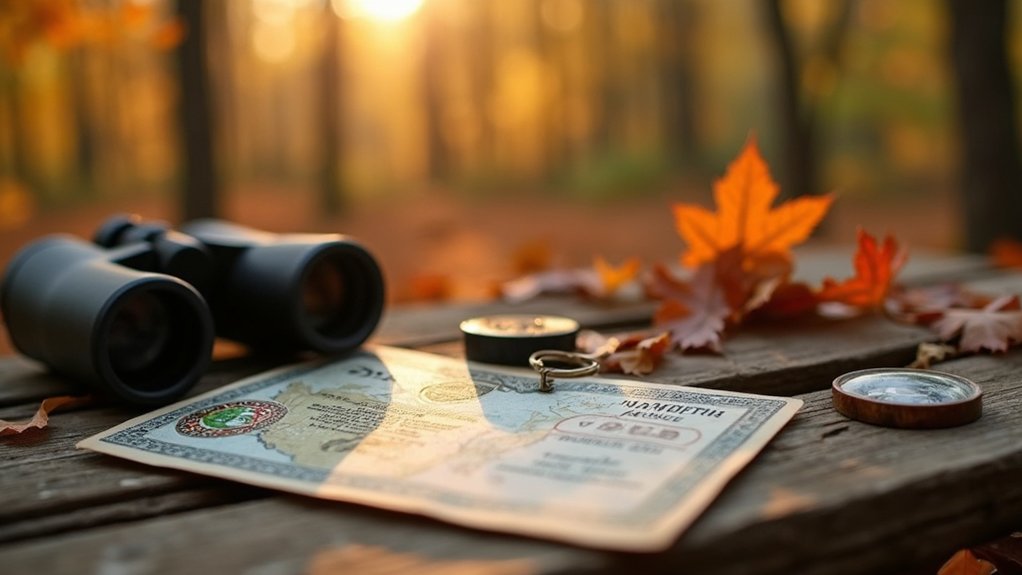If you’re considering hunting, it’s crucial to understand what hunting licenses are and why you need one. These permits not only provide the legal right to hunt but also guarantee that you’re following state regulations. You might be surprised by how licenses vary from place to place and what requirements you need to meet. Let’s explore the different types of licenses available and how they can shape your hunting experience.
What are hunting licenses and what do they entail?
Hunting licenses are essential documents that grant you permission to hunt specific game in designated areas. They typically include your name, address, and a unique identification number, which helps authorities track hunters.
You’ll need to choose the appropriate license based on the type of game you want to hunt, and it may vary by region and season. Some licenses require you to complete a safety course or pass a test.
Additionally, licenses often come with regulations, such as limits on the number of animals you can harvest. Staying informed about these details guarantees a responsible and enjoyable hunting experience.
Why do you need a hunting license to hunt legally?
Having a hunting license is a legal requirement that guarantees you’re hunting in compliance with state and local regulations. This license guarantees you understand essential rules, such as hunting seasons and species restrictions, helping to conserve wildlife populations.
Hunting without a license can lead to hefty fines, legal issues, and even confiscation of your gear. Additionally, a license promotes responsible hunting practices and safety, making the experience enjoyable for everyone.
How do hunting licenses vary by state or region?
While the fundamental purpose of hunting licenses is consistent across the United States, the specifics can differ widely by state or region. Each state sets its own regulations regarding license requirements, fees, and hunting seasons.
For instance, some states may require a hunter safety course, while others don’t. Additionally, certain regions might’ve special licenses for specific game or age groups.
You’ll also notice variations in the duration of licenses, with some being valid for just one season, while others can last multiple years. Always check your local guidelines to verify you’re compliant before heading out.
What are the different types of hunting licenses available?
Understanding the various types of hunting licenses available is key to ensuring a smooth hunting experience.
Most states offer different licenses based on game type, such as big game, small game, and waterfowl. You might also encounter combination licenses that allow you to hunt multiple species.
Additionally, some states provide youth licenses for hunters under a certain age and specialty permits for unique situations, like hunting during specific seasons.
If you’re planning to hunt on private land, you may need a landowner’s permit.
Familiarizing yourself with these options helps you choose the right license for your hunting adventures.
How do you apply for a hunting license?
How do you go about applying for a hunting license? It’s simpler than you might think! Here’s a quick guide to get you started:
- Research Requirements: Check your state’s regulations and find out what’s needed for your application. It’s essential to know the rules!
- Complete Training: Many states require a hunter safety course. Completing this not only prepares you but also builds confidence.
- Submit Application: Fill out the application form online or in person. Don’t forget to gather necessary documents and payment!
Following these steps brings you closer to the thrill of the hunt. Enjoy the adventure!
What are the age restrictions for obtaining hunting licenses?
When applying for a hunting license, knowing the age restrictions is key to confirm you meet the qualifications.
Generally, you must be at least 16 years old to obtain a full hunting license. Some states allow younger individuals to hunt with adult supervision or to obtain a youth license, usually for those aged 12 to 15.
Additionally, certain hunting courses may have age requirements, so it’s important to check your state’s regulations.
Always verify specific rules in your area, as they can vary considerably. Understanding these age limits guarantees you’re legally prepared and can enjoy your hunting experience safely.
What are the consequences of hunting without a license?
Hunting without a license can lead to serious consequences that you should be aware of before heading into the field.
Ignoring the law not only puts your safety at risk but also jeopardizes wildlife populations.
Here are three potential consequences you might face:
- Fines and Penalties: You could be slapped with hefty fines that strain your wallet.
- Legal Charges: Hunting unlawfully can result in criminal charges, impacting your record and future.
- Loss of Hunting Privileges: You may lose the right to hunt altogether, ruining your outdoor experience.
Think twice before risking these serious repercussions!
How can hunting licenses promote wildlife conservation?
While some might view hunting licenses merely as a bureaucratic requirement, they actually play an essential role in wildlife conservation.
When you purchase a license, you’re directly contributing to habitat preservation and species management initiatives. Funds generated from these licenses often support conservation programs, research, and educational efforts.
By regulating hunting, licenses help maintain balanced ecosystems, ensuring that wildlife populations remain sustainable. Additionally, they promote responsible hunting practices, reducing overharvesting and illegal activities.
Ultimately, your license empowers you to be part of a larger effort to protect and conserve the natural world for future generations, blending recreation with responsibility.
